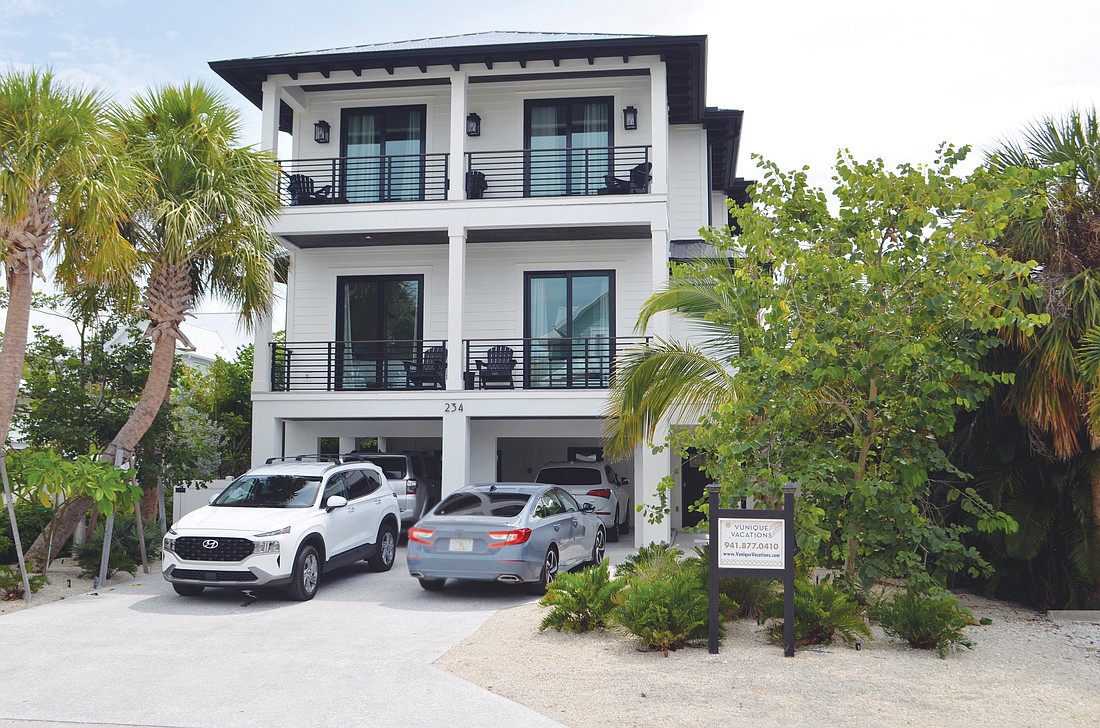- April 9, 2025
-
-
Loading

Loading

Sometime in early 2024, the Sarasota City Commission will consider and — from all indications — approve an ordinance that will expand citywide the vacation rental ordinance that currently applies only to about 135 properties on the barrier islands.
When it does, the approval will affect two related matters that came before commissioners on Monday: 1) An effective doubling of fees associated with the registration and monitoring of short-term rental properties doing business in residential neighborhoods; and 2) Potential litigation brought by the owners of three “hotel houses” on Lido Key.
By a 4-1 vote on second reading with Commissioner Erik Arroyo opposed, commissioners approved increasing fees on vacation rental operators on average from $150 per year to $350 in an attempt to close the gap of the cost of city personnel dedicated to registering, inspecting and monitoring the properties and the regulatory fees they generate.
Once the ordinance goes citywide, the scaling of revenues will hopefully offset if not exceed those costs.
The ordinance will not apply to owner-occupied short-term rentals, only to those operating an entire home as a business enterprise.
The ordinance could also be crafted to address a Bert Harris Act claim by three LLCs of common ownership of three vacation rental homes just steps away from Lido Beach, City Attorney Robert Fournier told commissioners.
That suit cites the devaluation of the homes, which were built before the ordinance was enacted and whose maximum occupancy exceeds said ordinance. The Bert J. Harris Jr. Private Property Rights Protection Act of 1995 provides a legal process for landowners to seek relief when their property is unfairly affected by government action.
That complaint was brought by three separate LLCs of common ownership doing business as Vunique Vacations, which owns three homes. Although all three can accommodate 16 people, restrictions placed on them after the fact limit two of them to 12 each and another to 10, based on a formula of two people per bedroom plus two additional people. The homes are at 234 Grant Drive, 209 Garfield Drive and 24 N. Polk Drive.
During their Oct. 2 meeting, commissioners unanimously agreed to allow the matter to go to litigation should the owners decide to file suit. In the interim, the owners' attorney, Scott Rudacille, sent a letter to the city requesting commissioners reconsider that decision and reiterated the owners’ proffers to adhere to several standards exceeding the ordinance in exchange for renting the properties at their occupancy capacity.
“Our client has been engaged with the city throughout the vacation rental ordinance process,” Rudacille told commissioners. “They never had any desire to seek monetary recuperation from the city, but they did have three units that they had invested a significant amount of money in prior to the ordinance. They want to recoup those funds. And so that was why they filed these claims.”
He said Vunique Vacations would restrict vehicles to those that will fit in the driveways, rent to no responsible party younger than 25, count children 2 years and older as occupants — the current ordinance has a threshold of age 6 — use noise-monitoring devices and employ other impact mitigating practices.
As cooperative as that sounds, commissioners were in agreement that a one-off exception to the ordinance would open the floodgates to many more.
“If we turn and revisit what we've already put into place, what is already working, I see this as a big mistake,” said Commissioner Jen Ahearn-Koch. “And not only will this open us up to more lawsuits, we'll be doing our community and our neighborhoods a disservice by revisiting this by adding new standards, by adding new requirements and by increasing the occupancy numbers and succumbing to this kind of a situation.”
“Would that leave us open to all of the other good-performing, long-term short-term rental properties to say, ‘We want a custom agreement also?’ So we could potentially have 135 custom agreements in the barrier islands?” asked Commissioner Debbie Trice.
Fournier confirmed that as a likely outcome.
On the other hand, the risk of going forward with litigation and losing would yield a similar result, if not worse, which is why he reminded commissioners that the citywide ordinance could be crafted to include some of the stipulations cited by the Vunique Vacations and stave off further lawsuits.
A proposed ordinance brought before the city as early as January will have to be vetted via the public process. In the interim, Vunique Vacations could choose to proceed with litigation unless, and even if, a stopgap measure is put in place.
City Manager Marlon Brown suggested a temporary agreement with the potential litigants to find middle ground while the citywide ordinance is crafted, an ordinance that may address their grievances.
“They could go ahead and file and we just say we won't attempt to enforce the ordinance for whatever the term of this agreement is,” Fournier said of a possible interim solution. “It could always be extended. I could see that as a possibility, but of course it requires the consent of both parties.”
Commissioners unanimously approved Fournier’s suggestion to leave in place the Oct. 2 decision to defend the ordinance should a suit be filed and also to direct him to include standards offered by Vunique Vacations in a citywide ordinance. He added that doesn't require the commisison to approve any proposed changes.
“At least the conversation could be held,” he said.